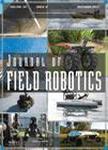版权所有:内蒙古大学图书馆 技术提供:维普资讯• 智图
内蒙古自治区呼和浩特市赛罕区大学西街235号 邮编: 010021

作者机构:Tecnol Monterrey Sch Engn & Sci Monterrey Mexico
出 版 物:《JOURNAL OF FIELD ROBOTICS》 (J. Field. Rob.)
年 卷 期:2025年第42卷第3期
页 面:867-879页
核心收录:
学科分类:12[管理学] 1201[管理学-管理科学与工程(可授管理学、工学学位)] 08[工学] 0811[工学-控制科学与工程]
基 金:The authors would like to acknowledge the financial and the technical support of Tecnologico de Monterrey, Mexico, in the production of this work, as well as Mexico's CONAHCYT (Consejo Nacional de Humanidades, Ciencias y Tecnologas) for its Master' Mexico's CONAHCYT (Consejo Nacional de Humanidades, Ciencias y Tecnologias)
主 题:disturbance rejection environmental conservation observer-based controller precision seed dispersal reforestation uncertainty and disturbance estimator (UDE) unmanned aerial vehicles (UAV)
摘 要:Reforestation is pivotal in mitigating climate change, preserving biodiversity, and safeguarding ecosystems. Precision reforestation implies efficiently using materials and human resources to conduct this intensive task. In this sense, using unmanned aerial vehicles (UAVs), also known as drones, improves the accuracy of dispensed seeds while increasing coverage and reducing labor. However, drone-based reforestation still presents technological challenges that need to be addressed. An important challenge is the presence of disturbances during flights due to environmental conditions, primarily unexpected wind, and the unavoidable loss of mass presented by the vehicle caused by the dispensing task. This paper evaluates the use of an observer-based controller to reject the particular disturbances caused by the sowing activity. Through meticulous experimentation and analysis, the study demonstrates the observer s adeptness in mitigating external disturbances, thereby enhancing the precision and stability of UAV operations. This technological advancement holds promise for diverse practical applications and has implications for environmental conservation efforts, particularly reforestation. The obtained experimental results confirm the viability of the proposed controller and observer framework, highlighting its potential to improve the robustness of environmental monitoring, conservation, and sustainable resource management practices.